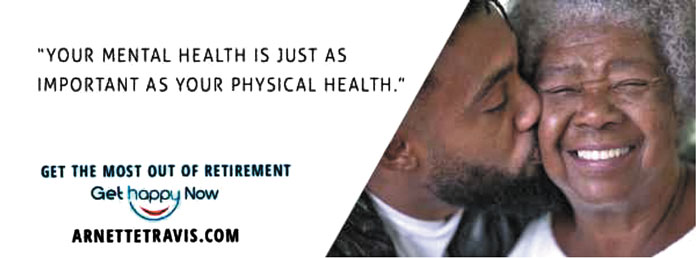
GET HAPPY NOW
By Arnette Travis, Author/Activist/Advocate, RLACEI Contributing Author
A
s my grandson says, I was born in the 1900s. Back then, my only knowledge of mental healthcare applied to people who were institutionalized at the Eastern State Hospital (formerly known as Eastern Kentucky Lunatic Asylum in Lexington), near where I grew up.
Thankfully, due to many years of study by various mental health professionals — psychiatrists, psychologists, social scientists, and the like – “normal” people now know (or should) that mental healthcare applies to everyone. But what does that care look like? Does it require professional help or psychotropic drugs? Can we provide mental care for ourselves?
I am not a mental health professional, but I will share what I’ve found to be effective self-mental healthcare during retirement that nurtures and maintains my overall wellbeing during this challenging life phase. (Realistically, every phase of life has its set of challenges, so this is just another in a lengthy line.)

You are worthy of a life filled with joy and happiness!
Invest in yourself. Find purpose and meaning to your life by spending time, energy and if necessary, money, to discover that one thing that excites, motivates and fulfills your soul. Retirement is the time to pursue things and hobbies in which you’ve always been interested. If not now, then when?
Indulge in daily physical activity. While an exercise program is a wonderful way to stay healthy, engagement in physical activities like walking, gardening, housekeeping, dancing, cycling or various sports, are also great ways to maintain your physical abilities and improve your mental health. As per Nike’s slogan: “Just do it!”
Implement stress reduction practices. While it is impossible to entirely eliminate stress, make a conscious effort to avoid situations, environments and people who trigger stress in you. Manage your finances (get help if necessary); cut ties or establish boundaries with negative associations and cultivate positive relationships. Meditation, yoga, tai-chi and breathing exercises are relaxation techniques that will help you manage stress and improve your overall well-being. Release and relax.
What are my options?
Our mental and physical health are connected in a way that is impossible to separate: what happens to one affects the other. Many of us have the ability to tend our own mental gardens. But here’s the rub: Safeguard your mental health or don’t. The choice is yours. Giving priority to protecting your mental health has immediate and long-term benefits. Failing to do so has immediate and long-term liabilities. Choose wisel












